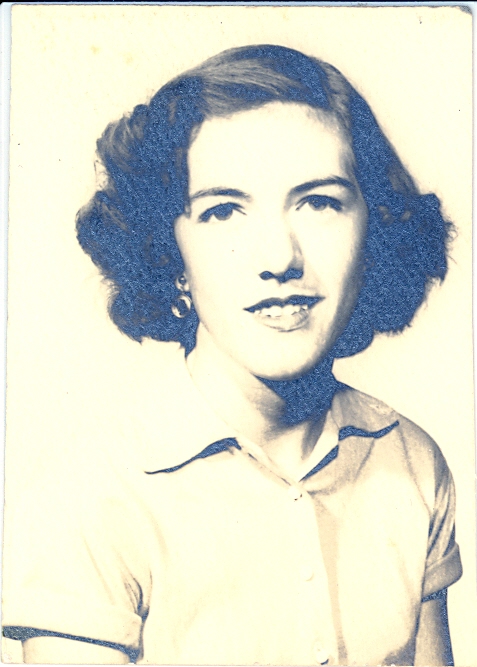TRANSCRIPTION


When you were growing up who was the most influential person?
We didn't know much about the outside world, I guess. We moved a lot, but probably my aunt May because I lived with her for a year and she got my teeth fixed for me. You know, they helped me a lot and I lived with them for a whole year so that should probably be the most influential woman, my mother's sister.
Did you work inside? Did you work at all?
I always worked inside with mama and my sister always worked outside with daddy. You know, that's just kind of the way it was, until we started moving around. She started to work as a car hopper when she was like 13 years old, but I didn't until I was a junior in high school. I worked in a little cafe in Jourdanton until I made enough money for my wedding dress. Hahaha. That's about it.
What professions were available for women?
Not as many as today. You know, I had thought a teacher, which is what I ended up being. You could be a nurse or a teacher or a sales, I can't really...like there weren't a lot. But I wanted to go to...what was the college?...it was...it used to be called something for women. It was at...I can't remember. It was in North Texas. It was a university just for women. I guess, you know, it was just for women or something. I had thought about going there, but of course I couldn't go anywhere. I didn't have the money and besides I got married, so...it was in Denton, that's where it was. Texas State College for Women I think it was called, something like that. But it was just for women back then. Yeah.
What were some of your possessions? What kind of clothing did you wear? Where did they come from?
Hm...well... A lot of them were like hand-me-downs from our cousins. We had some cousins that werer better off than us. We'd get real excited when we'd get a box of hand-me-downs from them. And mother, she didn't sew very well so...but I soon learn to sew. As soon as I was old enough I learned sew. And I put in zippers for her for, you know, things that couldn't learn haha to do. But I sewed. I had an older sister we just had hand-me-downs and whatever we could buy. I can't remember if there was any like... I don't know where she got our clothes because I know they didn't have as good stores. Now you can get things for real reasonable prices. We just didn't have a lot of clothes. I remember the... they had, when I was a teenager they called them squaw skirts, broom skirts. And they were three tiered skirts and we'd wear moccasins, and we'd wear those, like an Indian skirt and you'd wash them, and you'd starch them, and you'd pull them in a stocking and put them on the line like that to dry. They would like they were, like ironed down or something. That's our idea, you know, we had to iron everything. There wasn't such a thing as wash and wear. You don't know how lucking you have it, hahaha. Then when I was in high school we had the stand out slips. You'd wear the long skirt like that but you'd wear three or four of these net like stand out slips. I'm sure it looked ridiculous but we thought it was just quite stylish. That was in about '56 or 7. It was quite stylish.
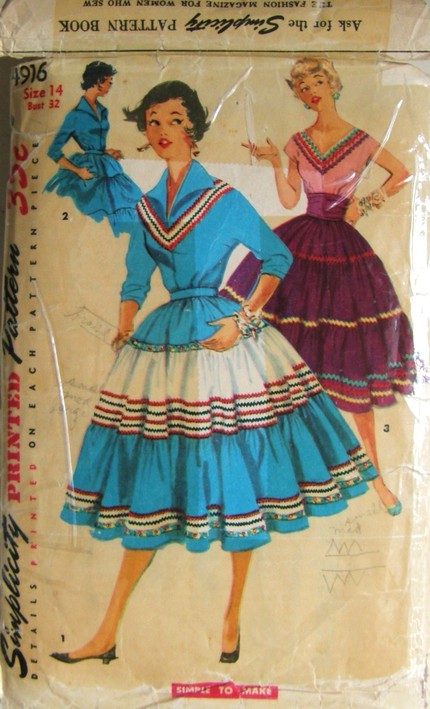
What town were you born in?
Decatur, Texas. There's an old saying: "She's an eighter from Decatur, the county seat of Wise". It's in Wise county Texas, near Fort Worth.
Where did you live the longest? I know you said you moved around a lot.
Probably the last two years I was in Jourdanton. It was two years in a row and... Otherwise maybe two years in...no I don't know...maybe not a whole two years and then a year with my aunt. I stayed with her one year, but I don't think I stayed two years anywhere hardly. We moved around a lot.
Was birth control readily available?
No...no...it was not. It was all up to the man. If anything they had those prophylactics. Of course I didn't know that until I was grown. I mean you know, I didn't know anything about that, of course. Do you remember how I told you how secretive mother was when she got her secret package because we didn't even know anything about that (The secret package was a box of "ladies products"). We were left in the dark about all that. I have no idea what kind of birth control my mother used. I imagine it was prophylactics. We didn't know anything about it. Or there would be twelve of us instead of six, who knows? haha, maybe.
Was it frowned upon for women to drink in public?
Mhmmmm, I'm sure. You know, my mother sure never did. Yeah, yeah, or go into bars really, you know. Especially unaccompanied, but yes that's right. It wasn't common at all. And they certainly didn't sell any liquor like beer or wine or anything in the grocery stores like they do now. You had to go to A liquor store, you know, to get anything like that. Now you can get wine at HEB.
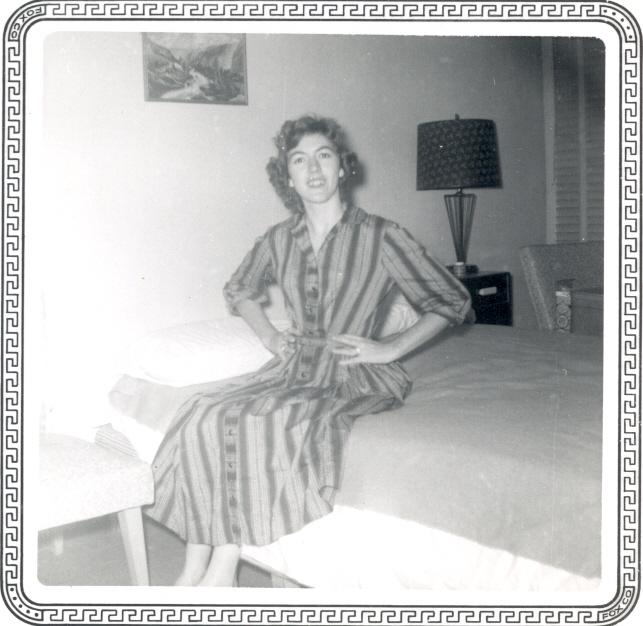
Could women dance in public?
Yeah, long as they were not dancing with another girl. You know, that's funny, they didn't have it like now, if the girl didn't have a boy to ask her to dance she would, you know, sit over there, like a...that's where the word wall flower came from, because you didn't get out and dance with another girl, you didn't dance by yourself. You know, you just had to wait until somebody asked you and I was a wall flower. I didn't dance really and Harvey didn't dance so that was ok. My sister taught me to dance when we went to junior/senior prom. He (Harvey) danced with me a couple times. We just did a two step. You know, he learned to do that, but we weren't dancers. He just went to humor me. He was sweet, very sweet. Harvey let Joanne teach him to dance, because...my older sister, she was divorced and she needed somebody to go and dance with her. She said "if you'll go and dance with me the other guys, they will ask me to dance because I'm a good dancer". So she taught Harvey to two step. He'd take her out for one dance and then she was okay. Wasn't that sweet? He didn't care for it much at all and we hardly ever danced.
Did you ever listen to music?
Yes, but not...usually...When I was in high school it was Fats Domino..." I found my frill on blueberry hill"...remember that one? Those...those Chubby Checker. I'm trying to think of some.
Did you have indoor plumbing? Did you enjoy it?
Yeeee....well...when did we first get indoor plumbing?...I'm trying to think of how old I was when we got a place with indoor plumbing...I think I was probably like 12 or something. OF COURSE I ENJOYED IT! Oh my goodness I just think "how did people live when they had those privy's?" That's just a horrible thought. But we did...We did what we had to do.
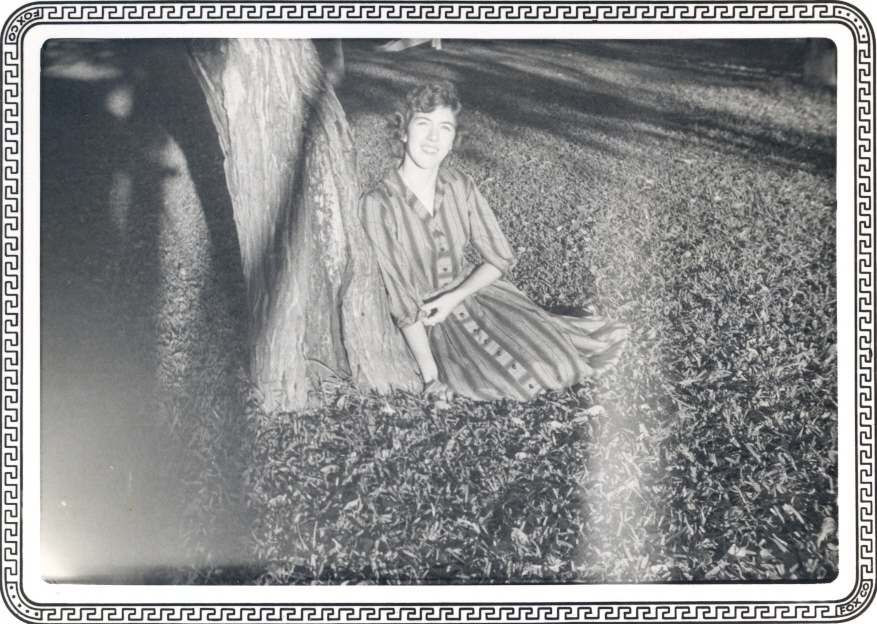
Did y'all have A/C?
No, we lived out in west Texas and what...if you were really lucky you had one of those um something...water coolers is what some people call them. They're in the window and the barrel turns and you would have straw kind of a mat over and the water goes through the straw mat and cools the air and it blows it into the house. This was...it doesn't work when you have high humidity, but out in west Texas it was grand. If we had that then we were lucky. Otherwise we might have had...I can't remember if we had a little floor fan or something. We slept with the windows open and the doors open. It's whatever you could do to sleep. Especially out in west Texas, but it was a dry heat out there. It wasn't as bad as like when we came to Crystal City and Jourdanton. It's a lot more humid. A little harder. But floor fans were, you know, rare, but good.
Do you think it was easier now vs. then?
Oh my goodness, things are so much easier now. It's just uh ridiculous. It's hard to even remember when you didn't have all these conveniences. It ... when I think about it I don't know how everything got done. I don't know how people kept, you know, I don't know how they stood each other before they had deodorant. You know, really, in the heat and the, you know, we just have it, it's very hard once you have something and think back. Let's see...and what was the other thing...They would dab their armpits with like alcohol and put baking powder and corn starch. That's what it was, that's what I asked a friend "what did y'all do for deodorant. We didn't do anything until we were teenagers. Cause we needed it, I guess. But they didn't have a roll on...I'm trying to think of when the roll on deodorant came. I think before that it was maybe a spray or something you pad on now. I just really can't remember. They should get a Nobel Prize, the one that invented the roll on deodorant. Men really weren't into it. But before then you just, you know, you could bathe and then you could use baking soda or whatever, yeah baking soda and talcum and cornstarch.
What would you say is the biggest difference between now and then?
People smell better. There's really no excuse now when we have running water and hot water and soap and deodorant, but there are people that, you know, go for days. I just can't imagine. You know, we have been, you're that young generation that has been spoiled to not have any body odor at all. So you really have a sensitive nose to it. If you'd drop into the pass you'd probably gag hahaha. But everybody was in the same boat. I guess the baking soda with the whatever must have worked pretty good. But you know, Grayce, the difference in that is that we used to have boils, we used to have other, you know, impetigo sores, and things from just poor hygein that soap and water would just probably keep you pretty healthy. Back then they didn't really have a chance. They had a lot more...I can remember every year when it was time to have school pictures made poor JoAnne would get an impetigo sore right on her face so they had to put this something violet something...it looked like a black patch on her face in the school picture. You know it was sad, but it was every spring. The kids would get boils and I don't know head lice. Poor things. My grandma had a show and it was just cold water. But it was...you know, they piped it up high and you could get under it and that was better. It was easier than the tub. Usually they brought in the family tub once a week. I think they started with the baby and you had to wait and wait using the same water. There wasn't much water to waste in west Texas. So your bath water was used maybe three or four times before you go in it. They'd be heating another pan of water on the stove to pour in it. Just think what you missed, Grayce. It was like camping out ALL the time! Yes, but we didn't know any different.
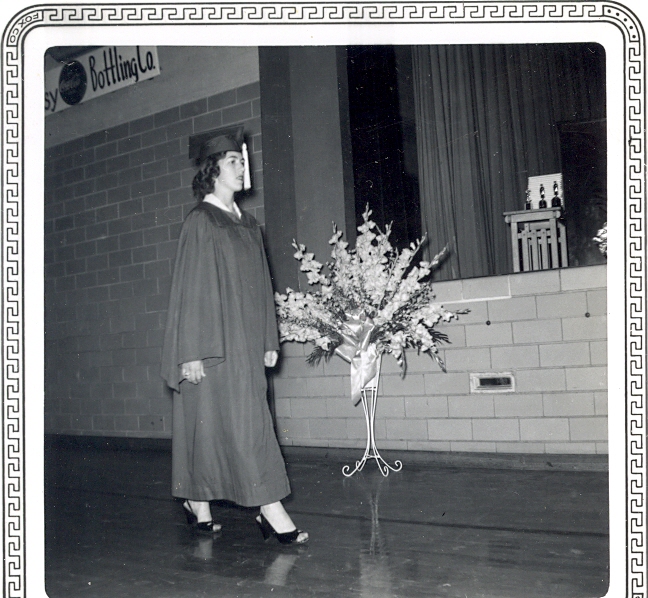
When you were in High School what was the biggest difference in the way boys were treated and the way girls were treated?
Well now, I think it was pretty democratic in school. If you made the grades you got the grades, you know pretty much. Although, girls weren't...I don't know if they were allowed but they certainly weren't expected to be in the FFA or the shop classes. They could be in...and boy didn't want to be in Home EC and the girls didn't want to learn to fix cars. And that all just gradually changed. I don't think the school would have forbid them doing it, I'm not sure. The guys, you know, I remember when they liked to take the Home Ec. or whatever because they got to eat the food and be around the girls so they kind of liked that, it kind of lost its stigma, but there wasn't any boys in our Home Ec. and there weren't any girls in Ag. or the you know, that class. I don't know that's just a gradual thing, isn't it?
When you were starting college did Harvey have a problem with you getting an education or working?
No, he had friends that would say "I can't believe you let Francie go to college!" and he's like "LET HER?! I encouraged her" and he was proud of me. I was just going as an art major. I wasn't going to be anything to productive on society for him. But I did change so that I could teach so that I could help him. His own sister said "I can't believe you're letting her go to college". He said, you know, "I'm proud of her and I encouraged her", yeah I loved him. But that was his own sister. Well, you know, a farmer needs to be married to a school teacher, or somebody that gets a check every month of the year. A farmer gets a payday once a year, you know, if the crop doesn't fail. So it worked out really well. Formers need school teacher wives. Yeah, he was very encouraging, proud of me. That helped.

What's a big difference between the way you raised your kids and the way kids are being raised now?
Well I didn't have a, sure never had baby sitters. We couldn't afford them. But they didn't have all this um...in fact we were lucky if we have a television that had maybe 1 channel. But they didn't have all the, they didn't have the video games, they didn't have little, their own little phone. All these things that kids have now. They entertained themselves. We didn't entertain them, really. But they just played outside and made up their own games and whatever. I don't know how they...I guess I look back on it and guess they were dreadfully bored, I don't know, but they didn't seem to be. No, they had made things out of things. They'd go out and make little play houses and things like that. I don't know about these kids that are so tied to their little phones and games. They need to just be out playing, you know, building, you know, mud forts or stick houses or whatever. We did a lot more imaginative things. My kids like to throw a quilt over the card table and make a little house out of it. They played with each other and entertained themselves. If they were lucky we could do 4-H with them. But they didn't do a lot of...they seem to expect more stimulation now. They didn't have movies on TV and all the Disney movies and you know all that.

What was it like having 5 other brothers and sisters?
I don't know! I sure did miss them when I stayed with my aunt that year. I just cried, I apparently really missed them. My aunt had a couple of little boys but that just wasn't the same. I didn't realize that I'd miss them that much, for a whole school year. We were separated, you know. I don't know we just kind of, you know, when you're an older sister you take care of each one. I'd take care of one of them and JoAnne would take care of one of them and then we had the baby. The baby was the last of the kids. By the time she was born JoAnne was old enough to go out. She worked at a drive in as a car hop when she was maybe 14, so she started work early.
When you were growing up what did you eat?
A lot of beans and rice, hahaha, and potatoes, yes. Meat, when we could get it, but not a lot of...and eggs...but not a lot of fresh vegetables.
Who was your favorite President?
Eisenhower...he's the one I remember the most from growing up.
Is there anything else you would like to add to this interview?
No, not really.
